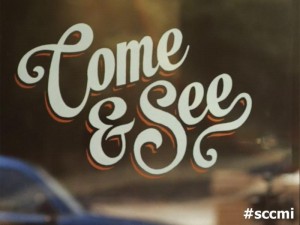
Come and See: The Cue to Who*
Sycamore Creek Church
March 22/23, 2015
Tom Arthur
Peace friends!
Today we continue in this series Come and See. We’ve learned so far that Jesus is someone who has to be experienced, not something to be explained. And when our lives show Jesus, people are more open to what we tell them. Most of us began following Jesus and joining a faith community because we were invited by someone. All of Jesus’ followers came through a simple invitation: come and see. The goal was not to explain something, but to experience someone. Jesus needs to be experienced, not explained.
There are two metaphors for how Jesus wants us to interact in the world: Salt and Light. Salt protects and light directs. Our actions are to protect and direct. People will then see your good works and glorify God. People are more compelled by what we do, not what we believe. A living example is better than a lengthy explanation. Our witness to other people hinges on what they witness us doing.
So today we’re going to dive into who you should invite to come and see. Sometimes it’s hard for us to invite. We feel awkward. Our culture says that faith is private, not to be put on public display. As a pastor, I tend to have the opposite problem at times. People find out I’m a pastor and they feel guilty. They expect me to invite them. They think I’m all about the money. Or they dive into a free counseling session (and I’m not even a very good counselor!). So while I have a unique set of obstacles that is a little different than your set of obstacles, we all struggle in some way with inviting. So today we’re going to look at the Who, When, and Why of inviting as Jesus models it for us with a Samaritan woman.
One day after baptizing some people in Judea (southern Israel), Jesus decides it’s time to go to Galilee (northern Israel). In between Judea and Galilee is Samaria. Usually Jews walked way out of the distance to not go through Samaria. For a modern example, think about a modern Israeli walking around Palestine so that they don’t have to go through Palestine. They come to Jacob’s Well and Jesus’ disciples head into town to buy some food while Jesus takes a break from the long trek. Here’s where we pick up the story:
Jesus, tired from the long walk, sat wearily beside the well about noontime. Soon a Samaritan woman came to draw water…
~John 4:6-7 NLT
Notice that it’s noontime. That’s an unusual time to be drawing water from the well. Usually you draw water when it’s cool in the morning or evening. But at noon it would be hot. Why would this woman be drawing water at the hottest time of the day? Maybe she’s trying to get away from everyone? Maybe she’s ashamed to be there when others are there. Maybe she’s just introverted and doesn’t want to talk to many people. I know the feeling. I’m introverted and would rather just go about my business and not talk to any strangers. So this interaction with someone is not a planned moment. Jesus is tired. This woman is likely trying to avoid people and gossip. Yet Jesus notices something and enters into the conversation. Where will it go?
Lately I know something of what this feels like. I’ve been trying to pull myself out of my introversion a bit by carrying two pennies in my right pocket. These two pennies represent two conversations I try to have each day with someone I don’t know. They remind me to enter into unplanned conversations. I’m always a bit ambivalent about entering into these conversations. Where will they lead? Sometimes they’re short and polite. But one time I ended up in an unplanned marital counseling session. Not what I had planned for the day!
Back to Jesus and the woman, there is no reason to have any interaction. Jesus didn’t have to do anything. Jewish men are not expected to interact with a Samaritan woman. So he could have just remained quiet, but he didn’t:
Jesus said to her, “Please give me a drink.”
~John 4:7 NLT
That’s it. That’s how he got into the conversation. Then what happened?
The woman was surprised, for Jews refuse to have anything to do with Samaritans. She said to Jesus, “You are a Jew, and I am a Samaritan woman. Why are you asking me for a drink?”
~John 4:9 NLT
The woman is surprised because Jewish men weren’t supposed to interact with Samaritan women. It made them ceremonially unclean. She was shocked. What’s this all about, she asks. They have a conversation about water and how Jesus is Living Water. Then Jesus says:
“Go and get your husband,” Jesus told her.
~John 4:16 NLT
Now if you know the rest of the story, you’re thinking to yourself, “Don’t bring up the part about the husband.” This conversation is quickly going into stormy waters. This is the moment when you kick your kids under the table which means, “Shut up. Don’t talk any more about THAT!” I somehow stumble into these kinds of conversations all the time. Over Christmas we went up north to Boyne City. We gave Micah a special gift: a ride in a Snow Cat Groomer at Boyne Mountain. He loved it! We rode up and down the mountain in this amazing machine grooming the ski hills with our driver named Steve. Micah was kind of entranced by the whole thing and was pretty quiet. So I struck up a conversation with Steve. I asked him if he had any kids. He had two. He went on to tell me about the younger one. Then I asked, “What about the older one?” This is when I needed my wife to kick me under the table and say, “Don’t ask about the older ONE!” Turns out his older son moved with his mom to North Carolina when she left Steve to marry another man. Doh! How did I end up in this place, this place where Jesus is about to end up bringing up the Samaritan woman’s husband. She says:
“I don’t have a husband,” the woman replied.
Jesus said, “You’re right! You don’t have a husband—for you have had five husbands, and you aren’t even married to the man you’re living with now. You certainly spoke the truth!”
~John 4:17-18
Ok, Jesus. Don’t you know that you just don’t go there? Come on! I wouldn’t suggest taking this exact approach unless you’re the Son of God. But there is a principle that we can learn from here: Jesus saw a cue and he engaged her. It was the perfect opportunity to not say anything. But Jesus decided to engage in the topic that was off the table. Jesus seemed to have cues about who he was going to engage, and there are cues for who we engage in our world and invite to experience Jesus at church. So who do we invite? We know the “WHOs” by paying attention to the “CUEs.” I want to talk about three cues to invite.
#1 – Not Going Well
When you see that something is not going well in someone’s life, that might be a cue to invest and invite. Someone’s marriage is falling apart. Their spouse had an affair. They had an affair. Their family is in conflict. A teenager is in trouble. A family member is estranged. Things aren’t going well in their career or job. Their boss is a jerk and they’re about to quit. These are all cues that something isn’t going well and it might be the time to invite them to church.
An objection may be raised: What does church have to do with my boss being a jerk? My boss needs church, not me. Here’s the answer: “I don’t know, but I’ve been in a spot before when things weren’t going well, and I’m just telling you, my faith in Jesus has helped me. And I don’t know exactly what it has to do with your situation, but you should come and see. I can’t explain it to you. I don’t have all the answers.”
This is not about you being the savior of the world. You just know the savior of the world. Your invitation in a season of things not going well, might be the thing that God uses to bring them into a relationship with Jesus. What if the situation doesn’t turn around? There may be a moment later when the realization hits that this was the thing that brought them to God. The first cue to who is that things are not going well.
#2 – Not prepared for
The second cue to who to invest and invite is that you see that something is happening they’re not prepared for. They got engaged, but don’t know how to be a spouse. They’re not prepared for kids, but they’ve got one. I know this well myself. Sarah and I were married for thirteen years before we had kids. Being married for thirteen years doesn’t give you much practice for being prepared to have a child. I experienced a male form of postpartum depression after my first son was born. So not only was I not prepared but it was not going well either! Or maybe a parent is not prepared for their kid going to school. Or a kid is not quite prepared for going off to college. Or parents aren’t prepared for an empty nest. Or you’re not prepared for caring for your aging parents.
An objection may be raised: What does the church have to do with my situation? Here’s the answer: “I don’t know. I don’t have all the answers. But when I wasn’t prepared for something in the past, I found my faith in Jesus helped me.”
So if you’re a guest here today you may be thinking: which one am I? What project am I for the person who invited me? Well, you’re not necessarily a project. Because there’s the third cue.
#3 – Not in church
If you’re not connected to a church then know that we created this faith community with you in mind. We wanted Sycamore Creek to be a church, a faith community for people who were not church people. We even adapt. Sunday morning doesn’t work? No problem. Get your Sunday on Monday. We work really hard to create a “come and see” culture here at SCC.
Maybe you’re thinking, “I can’t imagine wasting my time every Sunday morning. It’s one of my two days off.” Coming to a worship service competes with every other enjoyable use of time on the weekend: golf, swimming at the pool, shopping, doing projects around the house, sports. Some of us were in the same place. We couldn’t imagine giving up time every week. But we came because someone invited us to come and see, and we experienced someone. Now we can’t imagine not being here.
You invite someone because you value someone and you want to share what you value. Watch for the cues: something is not going well, something happens they’re not prepared for, or someone is not in church. These are cues to who to invest and invite. But what about when?
When?
So when is the right time to invite someone? There are some big invite days like Easter or any of the big days we do around SCC but, the best time to invite someone to church is next Sunday or Monday. I know that we all want it to be a perfect day: beginning a new great series, the perfect topic (not money!), not a guest speaker, and with all your favorite music. But don’t forget that God uses the small things: a smile, a kind word (to your child), a lyric in a song, the casual dress, they felt at home, they just enjoyed sitting and listening while their kids were taken care of in Kids Creek. So when is the best time to invite? This week.
So what might happen? Let’s go back to Jesus and see what happens with the Samaritan woman:
Just then his disciples came back. They were shocked to find him talking to a woman, but none of them had the nerve to ask, “What do you want with her?” or “Why are you talking to her?”
~John 4:27
Jesus is working off a different cue sheet than his disciples. They still have so much to learn. Because here’s what happens:
The woman left her water jar beside the well and ran back to the village, telling everyone…
~John 4:28
So how do you think she told that story?
“I was at the water hole and I met a guy…”
“Yeah, we’ve heard that one before!”
“Come and see a man who told me everything I ever did! Could he possibly be the Messiah?”
~John 4:29
Come and see. Come and see this person. I can’t explain it all. You’ve just got to experience him yourself. And so…
Many Samaritans from the village believed in Jesus because the woman had said, “He told me everything I ever did!
~John 4:39
She just shared her experience. No big long explanation. People can debate your explanation. But nobody can debate your experience.
When they came out to see him, they begged him to stay in their village. So he stayed for two days, long enough for many more to hear his message and believe. Then they said to the woman, “Now we believe, not just because of what you told us, but because we have heard him ourselves. Now we know that he is indeed the Savior of the world.”
~John 4:40-42
An experience of Jesus changes everything, not an explanation. What changed them was not her experience, but their experience. They experienced Jesus for themselves. And the experience changed what they believed. That’s the order of things most often. So next week: why the local church is the best place to experience Jesus.
As we’ve been talking, someone came to mind for you. Who is that? Someone you know that things are not going well. Someone you know that things are happening they’re not prepared for. Someone you know who is not connected to a church. Take some time, write down those names. Pray for them. Pray that God would open doors for you. Invest time in them. Then watch for God to open the door to invite them to church.
God, thank you for the example of your Son Jesus who showed us how to pay attention to the cues in the people’s lives around us. Give us the courage of his Spirit to invest and invite when we see those cues. In his name we ask these things. Amen.
*This sermon is based on a sermon first preached by Joel Thomas.





Recent Comments